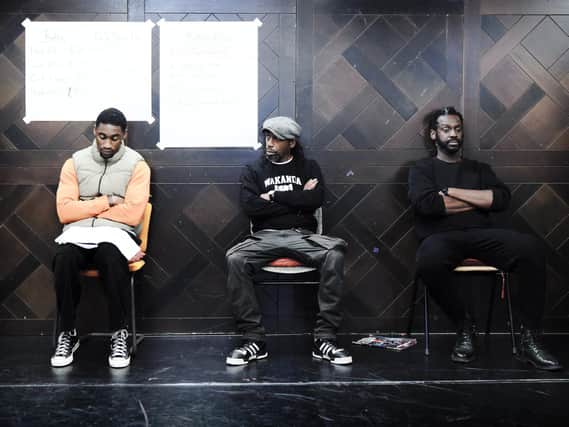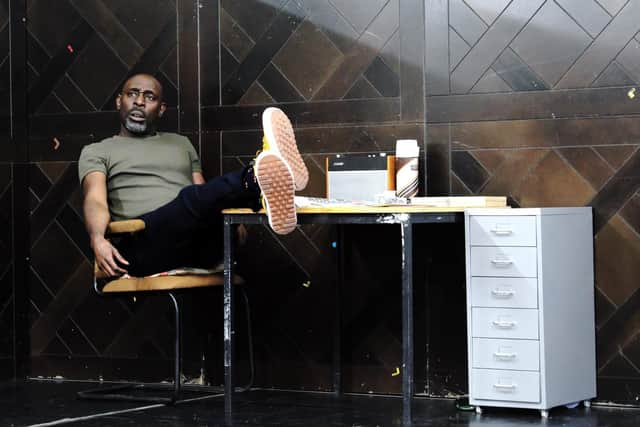The story of August Wilson's drama Jitney that is coming to Leeds Playhouse


And, while that is great, I’m a fan of meaty drama, something you can sink your teeth into and few things are as chewy as an August Wilson drama.
‘Theatre’s poet of Black America’ died 16 years ago, but his work is as alive and vibrant as ever. It’s difficult to overstate the importance of Wilson, but simultaneously difficult to perhaps understand it from a UK perspective.
Advertisement
Hide AdAdvertisement
Hide AdOne of only a handful of dramatists to win two Pulitzer Prizes, he was also the only African-American to have two plays running on Broadway simultaneously in 1988 with Joe Turner’s Come and Gone and Fences, later turned into an Oscar winning movie with Denzel Washington and Viola Davis.


When he set out, Wilson wanted to ‘tell a history that has never been told’ and to shape for the stage Black American narratives that had been ignored. He ended up earning a place alongside Arthur Miller and Eugene O’Neill as one of the great American playwrights of the last century.
Yorkshire audiences will be able to experience the power of Wilson when Jitney, one of Wilson’s earliest plays, opens at the Leeds Playhouse this weekend.
Director Tinuke Craig says: “He’s one of the great American dramatists. He has a theatre named after him on Broadway, he’s a huge deal. One of the things he did that was most impressive was that he wrote ten plays over the course of his career called The Pittsburgh Cycle, of which Jitney is one.
Advertisement
Hide AdAdvertisement
Hide AdEach of the plays is set in a different decade in the same area, famously including Ma Rainey’s Black Bottom and Fences.


“Jitney is set in the 70s but, interestingly, it was the first one he wrote because he didn’t write them in order.
“What’s exciting about the cycle is that each play works beautifully on its own, but they also do this amazing thing where they call and respond to each other.
"So, you get characters in Jitney who later turn up in Two Trains Running. It’s a whole rich world – a tapestry – built by a masterful playwright. He’s a documentarian of the black experience in America in that way.
Advertisement
Hide AdAdvertisement
Hide Ad“He’s an exciting, warm writer, full of music, full of rhythm and poetry – a very exciting voice.”
Jitney tells the story of Pittsburgh Hill District in the 1970s part of Wilson’s career-defining cycle. Based on the real-life story, it tells the story of the regular taxi cabs refusing to travel to the district and the inventive solution the community came up with for itself.
Jitneys – unofficial, unlicensed taxi cabs, were the answer. The Jitney drivers return to a station owned by Jim Becker, played in the Leeds production by Andrew French.
Craig says: “Ultimately it’s a love story about community and the strengths a community can have, particularly if it’s marginalised; how you are stronger together and how you can strive to change your circumstances with help from other people: people power, I guess.
Advertisement
Hide AdAdvertisement
Hide Ad“It’s also about misconnections, particularly between a father and son. A big part of the pattern of the show is things almost working out, but not quite making it. This leads to very vulnerable moments between men, something which is sadly still a rarity on stage.
“It feels quite exciting to see their inner sanctum – the jitney office – where they can be themselves and express themselves. This is especially important when the outside world is so harsh; where they have all the traits of poverty and racism keeping them in a position from which they can’t ascend.”
With its themes of separation, institutionalised racism, it feels heartbreakingly relevant in a week when a statue of George Floyd was defaced twice within days of being erected in New York.
“It’s a play about gentrification; about a place that historically belongs to a marginalised community that’s being taken over by a more affluent community. The people who originally lived there are being displaced, which, sadly, still feels quite relevant,” says Craig.
Advertisement
Hide AdAdvertisement
Hide Ad“There’s also something interesting about spending time with men – especially black men – in a piece that isn’t specifically about the black experience, which seems important at the moment when we’re considering how we consume media around blackness.”
So a meaty play that tackles difficult subjects. While it might seem a heavy night at the theatre, there is lightness and the heaviness needn’t feel oppressive. Ma Rainey’s Black Bottom, another play in the Wilson Pittsburgh Cycle, was recently adapted for the screen by Netflix and won the streaming service several Oscar nods. It makes it surprising that Wilson isn’t better known in the UK.
Craig says: “Black artists often fall into a place where they get marginalised and treated as niche or ‘special interest’. He fell victim to that, as a lot of black artists did at the time he was writing.
“His work is also not on the curriculum here, we don’t have the same access to the work, so it’s not put on very much – and so the cycle continues. It wouldn’t happen with someone like Arthur Miller.
Advertisement
Hide AdAdvertisement
Hide Ad“But it feels like a sea-change is happening, that more Wilson productions making it to the stage. It feels like there may be a resurgence coming, and that is very exciting.”
Universal themes in Wilson drama
When regular cabs won’t travel to the Pittsburgh Hill District in 1977, local residents turn to the unlicensed taxi company of Jim Becker and his fellow ‘jitney’ drivers. Director Tinuke Craig believes that this timely production has much to say to UK audiences.
“There’s the wider aspect of thinking about the history of the black experience in America. And, even though it’s very specifically set in America, it’s as relevant to people here in the UK. These things echo all over the world.”
Jitney, Leeds Playhouse, October 16 to November 6. Details and to book tickets leedsplayhouse.org.uk